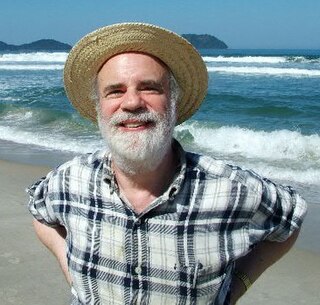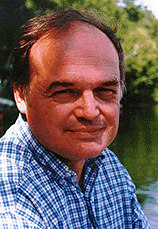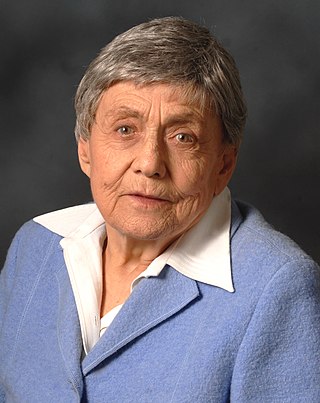Related Research Articles

George Edward Moore was an English philosopher, who with Bertrand Russell, Ludwig Wittgenstein and earlier Gottlob Frege was among the initiators of analytic philosophy. He and Russell began de-emphasizing the idealism which was then prevalent among British philosophers and became known for advocating common-sense concepts and contributing to ethics, epistemology and metaphysics. He was said to have had an "exceptional personality and moral character". Ray Monk dubbed him "the most revered philosopher of his era".

Saul Aaron Kripke was an American analytic philosopher and logician. He was Distinguished Professor of Philosophy at the Graduate Center of the City University of New York and emeritus professor at Princeton University. From the 1960s until his death, he was a central figure in a number of fields related to mathematical and modal logic, philosophy of language and mathematics, metaphysics, epistemology, and recursion theory.

Hilary Whitehall Putnam was an American philosopher, mathematician, computer scientist, and figure in analytic philosophy in the second half of the 20th century. He contributed to the studies of philosophy of mind, philosophy of language, philosophy of mathematics, and philosophy of science. Outside philosophy, Putnam contributed to mathematics and computer science. Together with Martin Davis he developed the Davis–Putnam algorithm for the Boolean satisfiability problem and he helped demonstrate the unsolvability of Hilbert's tenth problem.
Analytic philosophy is a broad, contemporary movement or tradition within Western philosophy, especially anglophone philosophy, focused on analysis as a philosophical method. It is characterized by a clarity of prose; rigor in arguments; and making use of formal logic and mathematics, and, to a lesser degree, the natural sciences. It is further characterized by an interest in language, semantics and meaning, known as the linguistic turn. It has developed several new branches of philosophy and logic, notably philosophy of language, philosophy of mathematics, philosophy of science, modern predicate logic and mathematical logic.

Max Black was an Azerbaijan-born British-American philosopher who was a leading figure in analytic philosophy in the years after World War II. He made contributions to the philosophy of language, the philosophy of mathematics and science, and the philosophy of art, also publishing studies of the work of philosophers such as Frege. His translation of Frege's published philosophical writing is a classic text.
Crispin James Garth Wright is a British philosopher, who has written on neo-Fregean (neo-logicist) philosophy of mathematics, Wittgenstein's later philosophy, and on issues related to truth, realism, cognitivism, skepticism, knowledge, and objectivity. He is Professor of Philosophical Research at the University of Stirling, and taught previously at the University of St Andrews, University of Aberdeen, New York University, Princeton University and University of Michigan.

George Stephen Boolos was an American philosopher and a mathematical logician who taught at the Massachusetts Institute of Technology.

Ruth Barcan Marcus was an American academic philosopher and logician best known for her work in modal and philosophical logic. She developed the first formal systems of quantified modal logic and in so doing introduced the schema or principle known as the Barcan formula. Marcus, who originally published as Ruth C. Barcan, was, as Don Garrett notes "one of the twentieth century's most important and influential philosopher-logicians". Timothy Williamson, in a 2008 celebration of Marcus' long career, states that many of her "main ideas are not just original, and clever, and beautiful, and fascinating, and influential, and way ahead of their time, but actually – I believe – true".

Gertrude Elizabeth Margaret Anscombe, usually cited as G. E. M. Anscombe or Elizabeth Anscombe, was a British analytic philosopher. She wrote on the philosophy of mind, philosophy of action, philosophical logic, philosophy of language, and ethics. She was a prominent figure of analytical Thomism, a Fellow of Somerville College, Oxford, and a professor of philosophy at the University of Cambridge.
Logical atomism is a philosophical view that originated in the early 20th century with the development of analytic philosophy. It holds that the world consists of ultimate logical "facts" that cannot be broken down any further, each of which can be understood independently of other facts.

Charlie Dunbar Broad, usually cited as C. D. Broad, was an English epistemologist, historian of philosophy, philosopher of science, moral philosopher, and writer on the philosophical aspects of psychical research. He was known for his thorough and dispassionate examinations of arguments in such works as Scientific Thought (1923), The Mind and Its Place in Nature (1925), and Examination of McTaggart's Philosophy.

Carl Gustav "Peter" Hempel was a German writer, philosopher, logician, and epistemologist. He was a major figure in logical empiricism, a 20th-century movement in the philosophy of science. Hempel articulated the deductive-nomological model of scientific explanation, which was considered the "standard model" of scientific explanation during the 1950s and 1960s. He is also known for the raven paradox and Hempel's dilemma.
Friedrich Waismann was an Austrian mathematician, physicist, and philosopher. He is best known for being a member of the Vienna Circle and one of the key theorists in logical positivism.
The linguistic turn was a major development in Western philosophy during the early 20th century, the most important characteristic of which is the focusing of philosophy primarily on the relations between language, language users, and the world.

Alice Ambrose Lazerowitz was an American philosopher, logician, and author.

The University of Cambridge was the birthplace of the 'Analytic' School of Philosophy in the early 20th century. The department is located in the Raised Faculty Building on the Sidgwick Site and is part of the Cambridge School of Arts and Humanities. The Faculty achieved the best possible results from The Times 2004 and the QAA Subject Review 2001 (24/24). In the UK as of 2020, it is ranked second by the Guardian, second by the Philosophical Gourmet Report, and fifth by the QS World University Rankings.

Stephan Körner, FBA was a British philosopher, who specialised in the work of Kant, the study of concepts, and in the philosophy of mathematics.
The aspects of Bertrand Russell's views on philosophy cover the changing viewpoints of philosopher and mathematician Bertrand Russell (1872–1970), from his early writings in 1896 until his death in February 1970.
Brian McGuinness was a Wittgenstein scholar best known for his translation, with David Pears, of the Tractatus-Logico-Philosophicus, and for his biography of the first half of Wittgenstein's life.
Juliet Floyd is professor of philosophy at Boston University. Her strongest research interests lie in early analytic philosophy and she has used early analytic philosophy as a lens to examine a diverse array of topics.
References
- ↑ Clare College: Master and Fellows
- ↑ "SMILEY, Prof. Timothy John". Who's Who. A & C Black. Retrieved 3 May 2017.
- ↑ "Timothy Smiley". Continuum. Retrieved 3 May 2017.
- ↑ Oliver, Alex (2005). "Smiley, Timothy (1930–)". In Brown, Stuart (ed.). The Dictionary of Twentieth Century British Philosophers. Thoemmes Press. p. 971.
- ↑ "Professor Timothy Smiley FBA". The British Academy. Retrieved 31 January 2025.
- ↑ Philosophical papers, online listing of Plural Descriptions and Many-Valued Functions, Alex Oliver and Timothy Oliver, 2005. Retrieved 30 December 2010
- ↑ Philosophical papers, online listing of What Are Sets, and What Are They For?, Alex Oliver and Timothy Oliver, 2006. Retrieved 30 December 2010
- ↑ Philosophical papers, online listing of The Force of Argument: Essays in Honor of Timothy Smiley. Retrieved 30 December 2010
- ↑ Lear, Jonathan; Oliver, Alex, eds. (2010). The Force of Argument: Essays in Honor of Timothy Smiley. Routledge. pp. 259–260. ISBN 9781138868496.
- ↑ Studies in the Philosophy of Logic and Knowledge, (co-edited with Thomas Baldwin.) Oxford University Press for the British Academy, 2005 Archived 29 March 2012 at the Wayback Machine . Retrieved 30 December 2010
- ↑ "Mathematics and Necessity: Essays in the History of Philosophy". The British Academy. Retrieved 31 January 2025.
- ↑ "Philosophical Logic". The British Academy. Retrieved 31 January 2025.
- ↑ "Philosophical Dialogues: Plato, Hume, Wittgenstein". The British Academy. Retrieved 31 January 2025.
- ↑ Cambridge University Press – publication listing. Multiple Conclusion Logic by D. J. Shoesmith and T. J. Smiley, reprinted 2009. Retrieved 30 December 2010